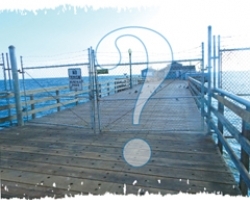Associate Engineer David Spitz told the City Council that the city has met the conditions for the California Coastal Commission to issue a permit to repair the Seal Beach Pier.
Spitz also said city staff would be meeting with representatives of the insurance company this month for a final review of the repair plans and the engineer’s cost estimates.
“I know there’s no way to hurry this up,” said Mayor Sandra Massa-Lavitt. “But hurry it up anyway.”
Once the costs are approved, the city can begin requesting bids for the project, according to Spitz.
He said that so far, the project is on schedule. (For a chart of the schedule for the pier repair project, see page 5.)
Spitz said the plans have been submitted to Coastal Commission staff.
According to his PowerPoint presentation to the council, the bidding process typically takes two to three months.
In August, several agencies issued tentative approvals for the repair project: The Regional Water Quality Control Board issued a draft certification for the project. The U.S. Army Corps of Engineers sent the city a provisional letter of permission in August. The Army will issue a permit after the city gets the coastal permit.
The end of the pier has been closed, off and on, since Ruby’s Diner closed up in January 2013. The pier then sustained damage from waves caused by a hurricane off the Mexican coast in late August 2014. Then a long-abandoned building, a former bait shop, at the end of the pier caught fire, ultimately destroying the former Ruby’s building in May 2016.
The Orange County Fire Authority attributed the cause to live wiring in the former bait shop. The buildings at the end of the pier were torn down and that part of the pier closed off.
In other news:
• The council unanimously authorized staff to seek a grant to complete the Lampson Avenue bike lane gap.
The project originally required 20 percent matching fees from the city, but to complete the estimated more than $1.26 million project the city will have to match about 50 percent of the cost of the design and construction phase of the project.
• During the public comment segment of the meeting, resident Bill Ayres proposed the creation of an oversight committee to bring financial discipline to city spending decisions. Ayres proposed a three-member panel composed of people with business backgrounds.











